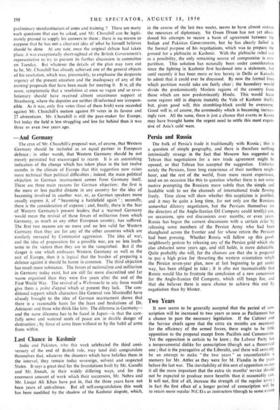Last Chance in Kashmir
India and Pakistan, who this week celebrated the third anni- versary of the end of British rule, may (and did) congratulate themselves that, whatever the disasters which have befallen them in the interval, they remain today sovereign, solvent and respected States. It says a great deal for the foundations built by Mr. Gandhi and Mr. Jinnah, in their widely differing ways, and for the enormous amount of work which their successors, Mr. Nehru and Mr. Liaqat Ali Khan have put in, that the three years have not been years of anti-climax. But all self-congratulation this week has been modified by the shadow of the Kashmir dispute, which, in the course of the last two weeks, seems to have almost outrun the resources of diplomacy. Sir Owen Dixon has not yet aban- doned his attempts to secure a basis of agreement between the Indian and Pakistan Governments, but he has clearly failed in the formal purpose of his negotiations, which was to prepare the ground for a plebiscite in Kashmir. With the plebiscite ruled out as a possibility, the only remaining source of compromise is now partition. This solution has naturally been under consideration since the fighting in Kashmir first hardened into a stalemate, but until recently it has been more or less heresy in Delhi or Karachi to admit that it could ever be discussed. By now the formal lines which partition would take are fairly clear ; the boundary would divide the predominantly Moslem regions of the country from those which are now predominantly Hindu. This would leave some regions still in dispute (notably the Vale of Kashmir itself), but, given good will, this stumbling-block could be overcome. Good will is, of course, the commodity which is becoming increas- ingly rare. All the same, there is just a chance that events in Korea may have brought home the urgent need to settle this most expen- sive of Asia's cold wars.


































 Previous page
Previous page